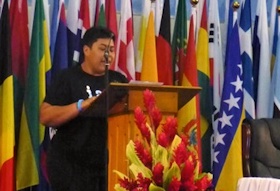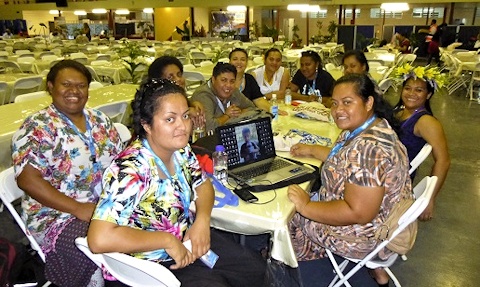Plenary Statement - Women's Major Group on Sustainable Development
Date:
Third International Conference on Small Islands Developing States
1-4 September 2014, Apia Samoa
PLENARY STATEMENT1
Women’s Major Group on Sustainable Development
Gender Equality: Transforming the S.A.M.O.A Pathway Towards a Sustainable Future
Distinguished Chair; Delegates; Friends;
We acknowledge the clear focus on gender equality, women’s human rights and empowerment in the S.A.M.O.A Pathway document. We are particularly pleased with the emphasis on women smallholders and small-scale food producers but call for fuller recognition of fisher women and those working in aquaculture, tourism, and for better safeguards for the security and empowerment of women working in non-traditional sectors.
We also acknowledge the political commitment demonstrated through the UN Women and WMG organized High Level side event on ‘Gender and Women’s Empowerment: Beyond Beijing+20 and the Post 2015 Development Agenda’ held yesterday, with the Governments of Samoa, Tuvalu and St Vincent and the Grenadines, and the SPC.
What we need now is a clear S.A.M.O.A Pathway implementation plan.
In such implementation, WMG reiterate that women and girls must never be instrumentalised. Women are not just implementers of development, but full rights bearers. We therefore welcome the clear commitment to end all forms of sexual and gender based violence, and to end all forms of discrimination against women. We urge that these issues remain front-and-centre in governmental positions for upcoming multilateral agreements.
We also call for clear affirmation of sexual and reproductive health and rights (SRHR), as central to realization of all other civil, political, economic, social and cultural rights. We commend Tonga, Vanuatu, Aruba, UK, the EU and others for strong supportive statements at this Conference. Young women advocates are also leading calls for Comprehensive Sexuality Education (CSE). We commend SIDS States already integrating such approaches, including Vanuatu, Fiji and others, and those such as Helen Clark, UNDP Administrator who affirmed this call, and on full recognition of SRHR.
Unfortunately, many SIDS States still criminalize adult same-sex relationships, enabling violence and discrimination against people with diverse sexual orientation and gender identity. This is contrary to universal human rights, and our traditions of fluidity, community care and wellbeing of all islander people. We look forward to removal of these archaic laws and penal codes, most from colonial pasts and now repealed in those origin countries, but still left over in ours. It is time to end another colonial hangover.
Further, we call for ratification and implementation of the Convention on the Rights of Persons with Disabilities (CRPD), with draw-down to national laws and policies. We also call for specific attention to intersectional discriminations faced by women and girls with disabilities. Therefore it is essential to recognize disability as a cross-cutting issue and we call for disability mainstreaming in all priority areas. Similarly, we support the calls of the Major Group Forum Outcome statement, and those of the Indigenous Peoples and Children and Youth Major Groups.

We commend SIDS leadership on climate change adaptation, mitigation and loss and damage as core to all development agreements. We commend those States and non-state actors now working actively on gender and climate change initiatives, on oceans health, and in particular using a biosphere approach to sustainable development recognizing interdependence of atmospheric, terrestrial and marine systems. Overall, we call for a future that is post-extractivist, with renewable, affordable and accessible energy technologies shared with SIDS under a ‘technology transfer’ pillar. We also call on SIDS members to prioritise climate-induced cross-border displacement in the human rights protection agenda, warranting urgent international attention, and for States to fulfil their obligations under the legally-binding conventions in the Chemicals & Wastes cluster, including the new Minamata Convention on Mercury.
We reiterate that in this discussion of partnerships, the’Global Partnership for Development’ must never be collapsed into the idea of ‘Partnerships’ in the plural. The Global Partnership for Development is specific, principally between governments of south and north countries, with north countries taking the lead in providing resources and means of implementation. A genuine and balanced global partnership requires all actors to prohibit, rather than perpetuate any global obstacles to sustainable development.
Finally, to be good-faith partners, ALL governments, business and international institutions must assess and address the impact of their policies and agreements on human rights inside and outside their borders.
The WMG will work with all partners of goodwill to ensure that the lives of women, girls, transpeople and men and boys in the SIDS states are rich, full and long, and that ALL SIDS people can look to the S.A.M.O.A Pathway to implement meaningful strategies and partnerships to deal with the many complex issues we must now all face in coming decades.
We thank you.
*Statement presented on behalf of WMG by Shirley Tagi, Coordinator, Diverse Voices and Action for Equality, Fiji;
DAWN associate; Pacific Feminist Coalition on SRHR; PPGCCSD;